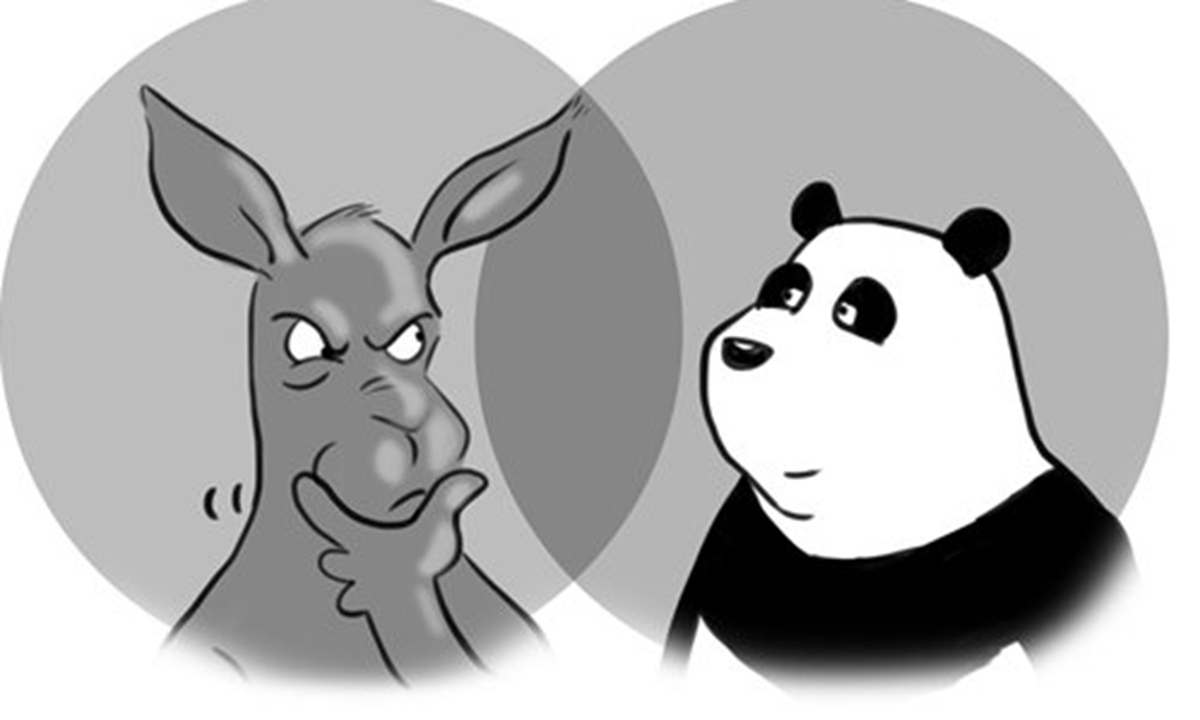Among US allies, why is Australia keen to attack China?: Global Times editorial
Source: Global Times Published: 2020/12/9 23:08:40

China Australia Illustration: Liu Rui/GT
China and Australia have been locked in strained ties, and exchanges at the ministerial level and above have been suspended for more than a year. Many voices in Australian public opinion portray China as a major external threat and challenge, while in the eyes of most Chinese, the image of Australia has been degraded to a US lackey at the forefront of the crackdown on China, from an important trading partner and a sound destination for overseas study and tourism. It's fair to say the mutual understanding of the two countries has undergone profound changes.
But what's surprising is that China and Australia have seemingly fallen afoul of each other for no reason at all. Even if many Chinese international relations scholars could find geopolitical reasons for this change, they find it inconceivable. Geographically, China and Australia are far away from each other. They have no historical feud or enmity, but have developed sound trade. There are enough reasons and resources for the two countries to maintain a friendly and cooperative relationship for a long time.
However, the reality is: In the eyes of the Chinese people, Australia is the most unfriendly country to China, second to the US. Australia took the lead in excluding Chinese tech company Huawei from the 5G rollout. It became the first developed country to pass laws against foreign interference that targeted China. Despite being an external country, it hyped the South China Sea issue harder than countries within the region. Chinese people generally believe Australia has returned China's goodwill with evil at Washington's prodding.
The Australian government said it won't pick sides between China and the US at the same time it intensified friction with China by issuing a series of policies that undermined China's interests and reputation. It argued it's a misinterpretation to say Australia is helping the US contain China.
Some Australian officials emphasized that Australia is doing what is necessary to safeguard its own interests, and its policy on Huawei is the same as Japan's. They also said Australia's attitude on many China-related issues is different from those of the US.
Australia thinks China should accept the reality that Canberra is an ally of Washington and any action taken by Canberra based on the alliance. It also believes China should respect Australia's freedom of speech and show no objection to Australia's attacks on China. It hopes it could interfere in China's internal affairs, while China should keep silent on Australia's affairs.
Not long ago a Chinese Foreign Ministry spokesperson tweeted a cartoon showing the atrocities of Australian soldiers in Afghanistan, which led to a strong reaction from Canberra.
As we see it, Canberra attaches too much importance to US allies and values, two factors which should not have led to the deterioration of Australia's ties with China. The US has many allies. There are also many Western countries who share the same values as Australia. Take Japan. Japan is a US ally who has territorial and historical disputes with China. The conditions for cooperation between China and Australia are far better than between China and Japan. But Australia has behaved more aggressively than Japan recently. Australia-China ties can't compare to ties between South Korea and China.
We hope Australia can reflect upon itself from this perspective. Many Western countries need to face the so-called challenges brought about by China's rise. But Australia is much more on guard than average Western countries. It is hard to find a justifiable excuse for its actions from whatever perspective.
We've noticed that there isn't much objection to Australia improving ties with China from Australian public opinion or the opposition party. Australian Prime Minister Morrison said recently that tension between Australia and China has been driven by incorrect assumptions shaped by the China-US rivalry.
2020 is almost over. Looking to 2021, China-Australia relations need to improve. The crux is that Australia should truly alter its attitude toward China and make adjustments rather than serving as a lap dog of the US while verbally saying it does not pick a side. Or else, it will continue to pay a price for its unreasonable China policy.
Posted in: EDITORIAL,CHINA-AUSTRALIA TIES